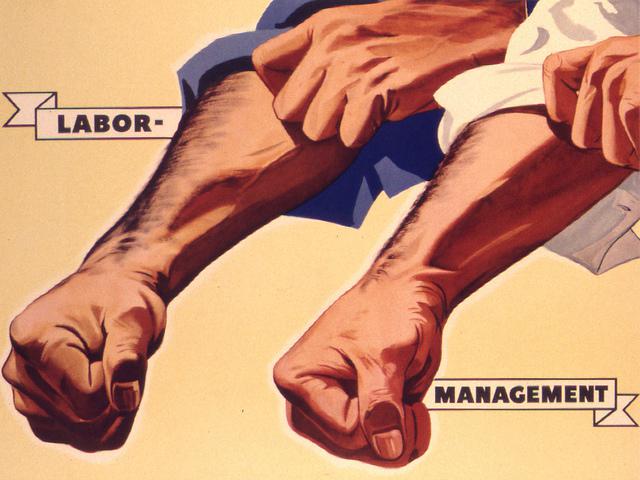Where is the Union for Arts Admin Workers?

Contrary to what you might expect from a New England-born Irish-American whose descendants worked on railroads, pubs, and politics, I was raised with a healthy ambivalence towards unions. For the most part, my parents regarded them as necessary evils—good for the protections and support that they offered to their members, bad for the bureaucratic barriers they built along the way. But having worked in not-for-profits and the arts since before I was legally able (oops!), and possibly because I've been listening to way too much Billy Bragg these last few months, I've started to think that there might be some value in bringing the camaraderie and collective bargaining of unions into the arts, specifically on the administrative side.
This is particularly relevant for professional theatre, where technicians, actors, and more all belong to some respective union whose guidelines they must work within. For all the frustration that bureaucracy can cause, those theatre professionals are still fortunate enough to know that their work—their art, in this case, which for all our lofty aspirations is still a form of labor—will not be exploited or abused. Even when the show is an absolute disaster, they are not expected to work without breaks, food, and rest, unless the group comes together and agrees to make that sacrifice (which often involves monetary compensation as well). Like arts administrative workers, many of these artists are also underpaid and overworked and nourished by the satisfaction they derive from their creative work. But they've also found a way to establish a system of rules and boundaries within that work of passion that protects their business interests without compromising their art.
Are there times when these union rules can stunt or stifle creativity? Sure. But there needs to be a clear demarcation between moderated exploitation (because frankly, that's what it is) and inexcusable labor abuse. When the choice comes down to sacrificing the quality of a product, or sacrificing the physical and mental well-being of the laborers who make that product, there needs to be someone looking out for the workers (or at least giving them an informed choice to consciously and willingly enter into a potentially harmful situation).
Are there times when these union rules can stunt or stifle creativity? Sure. But there needs to be a clear demarcation between moderated exploitation and inexcusable labor abuse.
But even though marketers, fundraisers, and other administrative staff play crucial roles in bringing theatre to the stage—and even though they probably willingly entered into the profession knowing full well that they would be overworked and undercompensated— they have no one to look out for their collective interests when the cast and crew go on the breaks that the union has afforded them.
Some companies are fortunate enough to have a human resources department, which can certainly help. But it’s important to remember that the purpose of such departments is to function as the human face of the company. At the end of the day, their job is to work in the best interest of the company itself, rather than for the individuals of whom the company is comprised. This is particularly ironic in the context of labor unions when one considers that most “companies” are made up of administrative workers, and bring in union-protected artists as freelancers to create the bulk of the company’s artistic output. Thus, if it's in the company's interest to mine its administrative workers for all they're worth with absolutely no regard for mental or physical health (let alone fair compensation), then human resources would be well within their rights to allow for such behaviors.
Many companies do try to create a feeling of community and supportiveness among their staff, reminding them that they're all in it together and working towards a greater purpose. They treat their staff like stakeholders in the company—when in fact, they're anything but. They have no incentive or anything else to be gained that directly correlates with their performance. They quite literally have no equity (ha!) in the work, whereas the audience, creative team, and administrative leaders of the company all stand to gain something in the overall transaction of a theatre experience.
So what’s to be done about it? For starters, we could take a few pointers from the Actor’s Equity Association.
Arts administrative workers should have the equivalent of an equity deputy on staff to function as a liaison to the board and management. Most nonprofit theatre companies are governed in part by a volunteer board, which is not unlike the board that runs a corporation. In most cases, this board is only familiar with the administrative managers and leaders, who they trust are acting in the best interests of the company as a whole. But the best intentions of those at the top don't always work out in the favor of the workers. What if the nonmanagerial staff could democratically elect a representative who had a voice, a vote, and veto power at upper management and volunteer board meetings? In this scenario, decisions made by the six-plus-digit-income managers and board members at the $5–15 million budget theatre would not go into effect unless the deputy approved on behalf of the other lower-middle-class-income-level staff members.
There should be clear requirements for notice given to schedule changes (as well as veto power, when applicable). According to Equity rules, companies are contractually obligated to inform actors ahead of time about any changes in schedules—if there’s an addendum to the rehearsal call, for example, or if there is to be a video/photo shoot.
Administrative staff, however, receive no such courtesies. As a result, staff members who already have their own rehearsals to attend for smaller companies, or families to take care of, are then forced into unfair and difficult positions. A supervisor might surprise them one afternoon by demanding that they be in attendance at that evening’s performance. The staff member must then decide: do they cancel their own rehearsal (if it’s not an equity production itself), or skip a parent-teacher conference for their child, or sacrifice whatever other preplanned event was scheduled for their off-work hours? Or do they tell the supervisor, “Sorry, I can’t tonight” and risk disciplinary measures for insubordination (despite the fact that they’re probably already working fifty hours a week as it is)?
Yes, emergencies happen. And sometimes sacrifices do have to be made. But it’s not an emergency if it happens two or three times per production; then it’s something that can be expected and planned for without exploiting people. The hardworking staff deserve the same courtesies as the artists on- and backstage, and something as simple as 24-hours notice is not asking for much.
Speaking of scheduling, arts workers deserve to have an enforceable minimum time off—and clearly established policies for overtime. Equity rules require at least one full day off per week; and of course, most traditional office jobs give their workers two days off on Saturday and Sunday. Despite the fact that they are not usually standard wage workers, Equity actors are also compensated fairly for any overtime work that they put in.
But what exactly constitutes “overtime” work for a salaried arts administrative worker? Certainly it gets messy when you consider that everyone in the company is potentially overworked and underpaid. But by way of personal anecdote, I once had an arts administration job where I was salaried at 35 hours per week with compensatory time off for additional hours worked, according to my employment contract. This position often required me to work 50 or more hours during the first week of a production (which I was absolutely willing to do). But when I tried to use that compensatory time, I was told that those hours did not count because they fell within the parameters of my job—despite the fact that my contract specifically stated otherwise.
In a separate situation, I was disciplined six different times over the course of two years for a mistake made during one show. This error occurred on my fifteenth consecutive day of work, during which time I was so busy that I was unable to pick up my prescription medication. This mistake could have easily been avoided if I had been allowed to rest and follow my doctor’s orders. Unfortunately, this was deemed an unreasonable request by those above me in the company hierarchy—another disheartening example of a human resources department that was not looking out for the interest of the worker.
There are people who subscribe to the belief that more hours mean more productivity. But there is absolutely no evidence for such a claim. On the contrary: people need rest in order to perform their best duties. While budgets might be tight at many theatre companies, this doesn’t mean that they should be allowed to overwork their staff to the point of potential health risks.
Yes, emergencies happen. But it’s not an emergency if it happens two or three times per production; then it’s something that can be expected and planned for without exploiting people.
And that brings me to my next point: arts administrative workers should be guaranteed safe working conditions. Call me Upton Sinclair, but it’s absurd to think in 2015 that a salaried worker with employer-assisted healthcare should be battling just to work in a healthy environment (again, in a field where salaries are typically lower than they are elsewhere for comparable work). What happens when your administrative offices are flooded and become infested with mold and mildew? Do you continue to come to work and risk breathing in noxious things and endangering your life? You could use your sick days, sure, but who knows how long the issue will last. And good luck trying to make an issue of it with human resources; after all, there's another show opening next week, which means you've still got tickets to sell.
Meanwhile, if the actors and crew involved in that same hypothetical production were exposed to the similar hazardous circumstances, you can bet there'd be an issue, and that some of that fourteen million dollar budget would immediately be used to remedy the situation.
In some careers, like sales or finance, there's at least a monetary incentive to make the personal sacrifice for the company. But in true American fashion, so many theatre companies—those bastions of idealism—reward only those at the top income levels, while still expecting the workers at the bottom of the totem pole (many of whom are also drowning in college loans) to work their hardest and make sacrifices for the company. What’s more, given the nature of theatrical producing, it’s difficult for these workers to have a family, or take on a second job (including theatre/creative work) to help them make ends meet financially.
That’s why arts administrative workers need a voice, just like artists themselves—a collective force that can stand up and say, “This is the bare minimum payment we require to live. These are the standards of working conditions that we need to survive.” They've willfully accepted a pay cut just to do the meaningful work they’re doing. So it’d be nice if there were better ways to ease the burden. After all, soul-fulfillment, like exposure, can’t pay the bills.
(Oh, and because someone is inevitably going to say that the money to support administrative staff would have to come out of the artistic budget, and the art itself should be the focus: that’s part of the problem, and good luck raising money and selling tickets and, you know, actually putting on a show without 'em.)












Comments
The article is just the start of the conversation—we want to know what you think about this subject, too! HowlRound is a space for knowledge-sharing, and we welcome spirited, thoughtful, and on-topic dialogue. Find our full comments policy here
Thom -
Although (as one who had a 14 year marketing/advertising career - some within non-profit - the rest corporate or agency) I feel your pain, you have just defined the nature and experience of any marketing/administrative position I held in any and all organizations. In other words - the nature of the beast when a salaried, full-time employee. If I shared the situations I was placed in over and over again your hair would stand on end.
I'm not saying this is right. But even with employment law and HR teams, people are asked, bullied, and guilted into all kinds of things by bad leadership and lousy organizations in order to just keep their jobs.
How can one change this is arts admin? Be willing to sacrifice a job, be vocal about those teams doing it well (Sean Daniels for example?), and call out those with negligent and abusive practices.
You are right that this nonsense is awful and needs to be addressed, but I believe you and your colleagues can do a lot to change your world by simply deciding what you will accept and not compromising. Would it help if you had a Union to stand behind you? I'm sure it would. But at some point we all have to take leadership, ownership, and stand up for ourselves.
Seems to me like you already have begun doing the above with the simple task of beginning the conversation! In which case, well done!
I'm afraid from a legal standpoint arts admins probably can't unionize - they would fall on the side of management. But most of the problems conveyed here - most especially the healthy workplace - are addressed through labor laws. OSHA would explicitly cover the health hazard, and wage laws prevent any overtime obligations at less than $455, or if it would make hourly wages fall below minimum wage. Again, consulting state and federal laws and ordinances would remedy a lot of these complaints, as would clear communication with the board, who are obligated to serve the well being of admins and creative employees alike.
Are you familiar with ATPAM?
I would hate to see employment in arts administration become sclerotic and bound by all sorts of rules. The arts thrive with flexibility, and flexibility is extraordinarily difficult in a unionized environment (as most of us know.)
Furthermore, I think many of us in the arts are frustrated by how much more difficult and expensive our art forms/business models/etc are specifically because our actors, or orchestra players, or stage crew, or house staff is unionized. One can acknowledge the importance of unions without overlooking how INCREDIBLY hard many of them are to work with. I imagine this leaves a bad taste in the mouths of some arts admin employees.
When I think about my own large arts org with its 100+ employees, I can't help but realize how many of the people who work the longest hours and put in the most effort and get caught up in exactly the situation you describe would not be part of a union because they are managers. Would such a union effectively just be for admin assistants? Or only for small organizations that don't have extensive management structures? Would small organizations, suddenly beholden to a new kind of union and the costs and work rules that come with it, find themselves literally unable to produce the kind of work they are used to producing?
I'm not saying this is terrible idea, but it brings up a lot of questions. The issues in many arts admin jobs you point out are very real, but I'm not sure if unionizing employees is the best way (or even a sensible way at all) to fix them.
So then what's the alternative? Maybe it's not the best answer, but while we're waiting to figure out the "right" way to do it, the working class is still suffering as a result. Because while those union limitations on productions are frustrating (and don't get me wrong — they are), they also help protect people from exploitation. While it may be frustrating for administrators, the alternative situation is one that abuses the artists. And for all that administrators might, from their ivory towers, see this is a larger problem, I don't see anyone else offering a better solution.